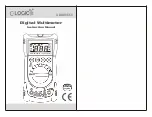
53
multiple times to retrieve the same data.
When measuring configuration changes, or when executing any of the following commands, the instrument will
clear all measurements from the reading memory: INITiate, MEASure:<function>?, READ?, *RST,
SYSTem:PRESet.
Syntax:
FETCh?
Parameters:
(none)
Example:
Combine CONFigure and INITiate with FETCh?. The INITiate command places the instrument in the
"waiting for trigger" state, triggers the measurement when the rear panel Ext Trig input is a pulse signal (low by
default), and sends the measurement to the user. The FETCh? query copies the measurement from the reading
memory to the instrument's output buffer.
CONF: VOLT: DC 10, 0.003
TRIG: SOUR EXT
SAMP: COUN 4
INIT
FETC?
Typical response: -4.98748741E-01, -4.335163427E-01, -4.33118686E-01, -3.48109378E-01
8.2.3.4 R?
Description:
Read and erase all measurements from the reading memory
Syntax:
R?
Parameters:
(none)
Example:
R?
Typical response: -4.98748741E-01, -4.335163427E-01, -4.33118686E-01, -3.48109378E-01
8.2.3.5 READ?
Description:
Start a new set of measurements, wait for all measurements to complete and transfer all available
measurements. Sending READ? is similar to sending INITiate;:FETCh?.
Syntax:
READ?
Parameters:
(none)
Example:
Take the measurement from the reading memory:
READ?
Typical response: -4.98748741E-01, -4.335163427E-01, -4.33118686E-01, -3.48109378E-01
8.2.3.6 TRIGger:COUNt
Description:
Set the number of triggers the instrument accepts. When the number of triggers reaches the set value,
the instrument will return to the "idle" state and no longer trigger.
Syntax:
TRIGger:COUNt {<count>|MIN|MAX|DEF|INFinity}
TRIGger:COUNt? [{MIN|MAX|DEF}]
Parameters:
<count>: 1-1,000,000 or Infinuity. Default: 1
Example:
Return ten sets of five DC voltage measurements and start each measurement group with an external
















































